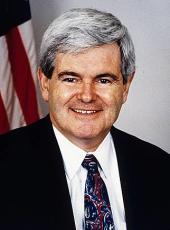
Gingrich Campaign Press Release - In Iowa City, Gingrich Outlines Brain Science Initiative
Iowa City, IA — Following a meeting with doctors and researchers at the University of Iowa College of Public Health, Newt Gingrich outlined a new Brain Science Initiative that would improve the lives of millions of Americans while saving money and creating jobs.
The Brain Science Initiative builds upon Gingrich's commitment in the 21st Century Contract with America to reform government in ways that maximize the speed and impact of medical breakthroughs.
"Maximizing brain science breakthroughs can offer hope to millions of Americans impacted by Alzheimer's, autism, Parkinson's, traumatic brain injuries and more, while potentially saving trillions of dollars and creating thousands of new American jobs," said Gingrich.
Gingrich pointed out that Alzheimer's disease represents a $20 trillion combined public and private liability through 2050 and that postponing the onset of the disease by just 5 years could save $6 to $8 trillion.
"There is no single reform that could lower the cost of Medicare and Medicaid on the scale that breakthroughs in brain science could," said Gingrich.
There are over five million Americans suffering from Alzheimer's disease. Furthermore, Alzheimer's doesn't just affect the patient. Caregivers in Alzheimer's families are twice as likely to have health problems from the stress of taking care of loved ones over a long period of time.
The Brain Science Initiative has four components:
1. A public-private research initiative to map the brain and maximize our understanding of how it works and what effects it.
2. A fundamentally reformed, 21st century Food and Drug Administration which has the mission of understanding emerging new science and accelerating its development from the laboratory to the patient.
3. The elimination of the capital gains tax so hundreds of billions of dollars in new investments pour into the United States, creating a generation of Steve Jobs and Bill Gates in founding and growing companies that deliver brain-related medical treatments worldwide.
4. Developing an integrated public-private partnership to use new technologies to minimize the stress of caregiving and maximize the potential for independent living for those with brain disorders.
This four part initiative will be developed in detail over the next few months in collaboration with brain scientists, doctors, dedicated institutions, and advocates.
From item #8 in Newt's 21st Century Contract with America:
8. Maximize the speed and impact of medical breakthroughs by removing unnecessary obstacles that block new treatments from reaching patients and emphasizing research spending toward urgent national priorities, like brain science with its impact on Alzheimer's, autism, Parkinson's, mental health and other conditions that knowledge of the brain will help solve.
Americans' vigilant defense of Creator-endowed rights, rule of law, and intellectual freedom has long drawn risk-takers, innovators and brilliant minds from all around the globe.
It is no coincidence that the vast majority of the major scientific and health-related breakthroughs of the last two centuries have occurred here.
Today, we are on the cusp of an explosion of new science that will create new opportunities in health, agriculture, energy, and materials technology.
Breakthroughs in brain science, in particular, will open up enormous opportunities for cures and treatments for Alzheimer's, Parkinson's, autism, mental illness and learning disabilities.
The question in the twenty-first century is whether we reform our system so we can educate, regulate, and invest in a way that allows us to continue to be at the forefront of innovation.
A key first step is to transform the Food and Drug Administration to allow these breakthroughs to proceed rapidly.
Nearly a quarter of all products Americans consume are regulated by the FDA. Every drug and medical device we use, as well as nearly 80 percent of our food supply, must pass FDA muster before heading to the market.
Americans deserve a fair and competent regulatory regime that emphasizes both consumer safety and ensures that life-saving breakthrough products get from our labs to our pharmacies and homes as efficiently as possible.
Unfortunately, the current FDA falls well short of this expectation, and its stagnant, bureaucratic and byzantine regulatory guidelines are scaring off new investment and driving innovators overseas. This is bad news for American jobs and competitiveness, and downright awful news for anyone who wants to ensure that life-saving medicines and devices can get to patients as quickly as possible.
The goal of a new 21st century FDA must be to ensure that in America knowledge moves to the market so rapidly that no other country in the world can compete with us in developing and marketing new solutions for health, food, energy, and materials technology.
Furthermore, government agencies such as the National Institutes for Heath have the opportunity to use scientific research funding today in a way that will avert massive costs and human suffering in the future.
As Americans now live longer than ever, one of the greatest fiscal threats in health is the rising cost of treating Alzheimer's patients. The current estimate is that the combined public and private cost of Alzheimer's between today to 2050 will be $20 trillion. That is one and a half times the current total federal debt.
But a smart emphasis on brain science and innovation today can change this projection for the better.
Newt Gingrich, Gingrich Campaign Press Release - In Iowa City, Gingrich Outlines Brain Science Initiative Online by Gerhard Peters and John T. Woolley, The American Presidency Project https://www.presidency.ucsb.edu/node/297981
